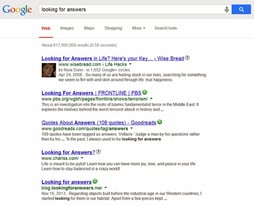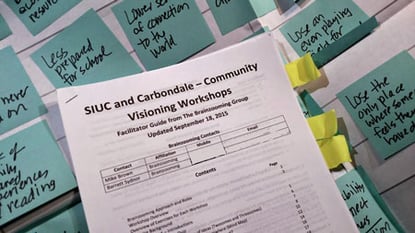 The easy answer to finding an answer for a question you have is “Googling it.”
The easy answer to finding an answer for a question you have is “Googling it.”
While Googling is a ubiquitous way to find and process possible answers from global sources on the web, there’s more to getting solid answers you can confidently use.
Getting to solid answers that are either exactly or directionally accurate requires applying several strategic thinking skills involved beyond just Googling your question and grabbing a fast answer.
6 Search Tips beyond Googling Your Question
To improve not only your online search results, but the real results from answering your question, develop and use these six strategic thinking skills:
1. Imagine your search results before you start Googling
Before you start Googling, develop a sense of what types of answers you might find or at least the forms your answers may take. With this backdrop, you're in a much better position to quickly evaluate whether you are on the right path with your search results.
2. Push outside your social network for answers
Increasingly, results served up to you online represent a small circle of what Google or other platforms think / believe / know will be most valuable to you. I'm too skeptical to depend exclusively on an algorithm to shape my search. Log out of Google and other applications as best you can to search a wider range of possibilities outside your social network.
3. Don't read too extensively as you search
Grab as much information as you can as fast as you can without reading everything. Particularly if the answer is important, don't settle for what might seem like the exact answer right away. Even if it appears you have a solid answer, do more looking to confirm or refute your apparently quick solution.
4. Compare possible answers to your initial expectations
As you begin scanning the initial search results, compare them to what you initially expected as an answer. This is vital since so much of the information you’ll get by Googling your question has never been properly vetted and fact checked. These days, fact checking sits squarely on the searcher’s shoulders. Be skeptical but also be open to having your initial perceptions of what you'll find challenged or overturned.
5. Look for important disagreements in data
If every source is reporting the same thing, chances are it all came from a single source. When you don’t find a healthy amount of disagreement or variation from multiple information sources, you have a problem. To get a sense of being on the right path toward an answer to your question, go digging for greater information diversity.
6. Keep a running list of insights
As you review search results, jot down initial impressions, major points of agreement or disagreement, supporting points for your answer, ideas from your review, and clues to other places or resources to search. This list is your summarized recap of what your search yielded.
Strategic Thinking Skills Deliver the Best Answers
These six strategic thinking skills will serve you well so you do not just seize the first, and potentially wrong, answers from Googling your question blindly. - Mike Brown



